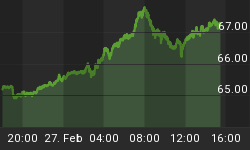Maduro wants to cash in Venezuela’s gold stashes as he tries to hang on to power—possibly with Russian assistance—and the opposition-declared “president in charge” is trying to stop it before it happens.
Venezuela's self-proclaimed interim leader Juan Guaidó has called on British authorities not to release $1.2 billion in Venezuelan gold reserves to the desperate and cash-strapped Maduro regime.
"I am writing to ask you to stop this illegitimate transaction. If the money is transferred ... it will be used by the illegitimate and kleptocratic regime of Nicolas Maduro to repress and brutalize the Venezuelan people," Guaidó wrote in a letter addressed to UK Prime Minister Theresa May and Bank of England Governor Mark Carney.
Instead, the “president in charge” wants it to go to him.
Venezuela’s holdings at the bank more than doubled last December to 31 tons, or around $1.2 billion, after Venezuela returned funds it had borrowed from Deutsche Bank AG through a financing arrangement with gold used as collateral.
Maduro’s government wants the gold back at home—more so than ever—but the Bank of England hasn’t been playing ball.
Retrieving the gold in the Bank of England has been a major priority for the Maduro regime. Last December, Venezuela’s central bank even made a trip to UK that sought to gain access to it but the talks proved to be unsuccessful.
Last Friday, Bank of England once again denied the request followed with a public statement: “In all its operations, the Bank observes the highest standards of risk management and abides by all relevant legislation, including applicable financial sanctions.” Related: Americans Are Not Ready For A Recession
The bank’s decision to deny Maduro’s withdrawal request comes after top U.S. officials lobbied their British counterparts to help cut off the regime from its overseas assets. U.S. sanctions mean that it’s not so easy anymore for Venezuela to get swap agreements.
Venezuela is said to have around $8 billion in foreign reserves. That $1.2 billion in gold is part of that. Where the rest is, no one’s quite sure.
For a while, Maduro was making some money by exporting gold to Turkey, but that has dried up to largely nothing as of the last quarter of 2018, according to Turkish customs data cited by media.
Last week, Guaidó, head of the opposition-led National Assembly invoked the constitution to declare himself the nation's "president in charge."
Related: Private Firms Spent Record $93 Billion On Natural Resources
Trump has formally recognized Guaido same day and praised his plan to hold new elections. Canada followed suit, as did a number of Latin American governments (Mexico excluded).
European Council and Parliament initially both backed the National Assembly but fell short of recognizing Guaidó as interim president. Brussels is calling on Maduro to hold free elections within eight days or they will recognize Guaidó as president.
Russia and Cuba are steadfastly supporting Maduro. Now, Russian mercenaries are reportedly protecting Maduro, adding another layer of uncertainty to what happens next. This is now a standoff not only between Maduro and the opposition, but also between a Western coalition and Russia-plus-China, which have vested interests in Venezuela.
By Charles Benavidez for Safehaven.com
More Top Reads From Safehaven.com
















